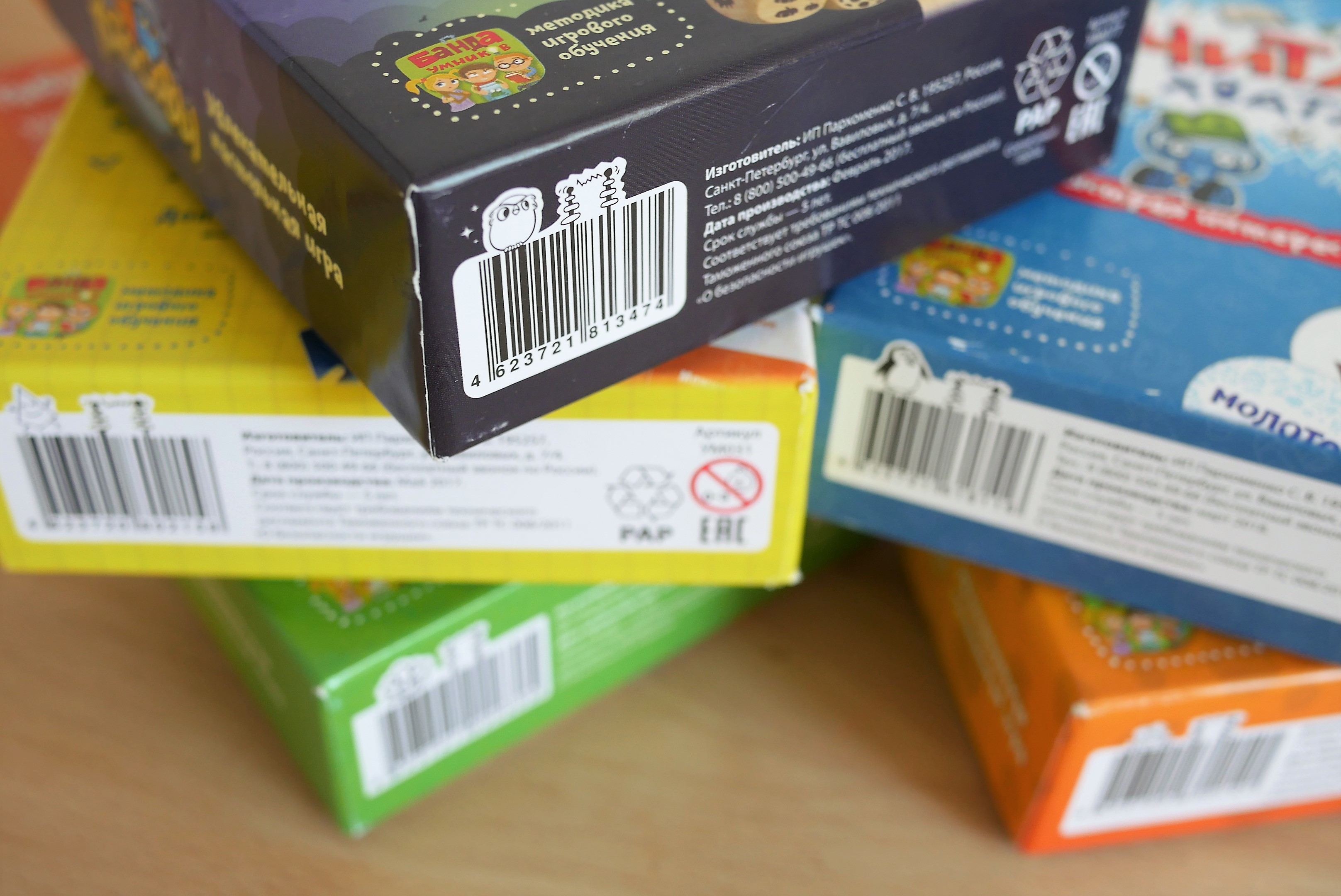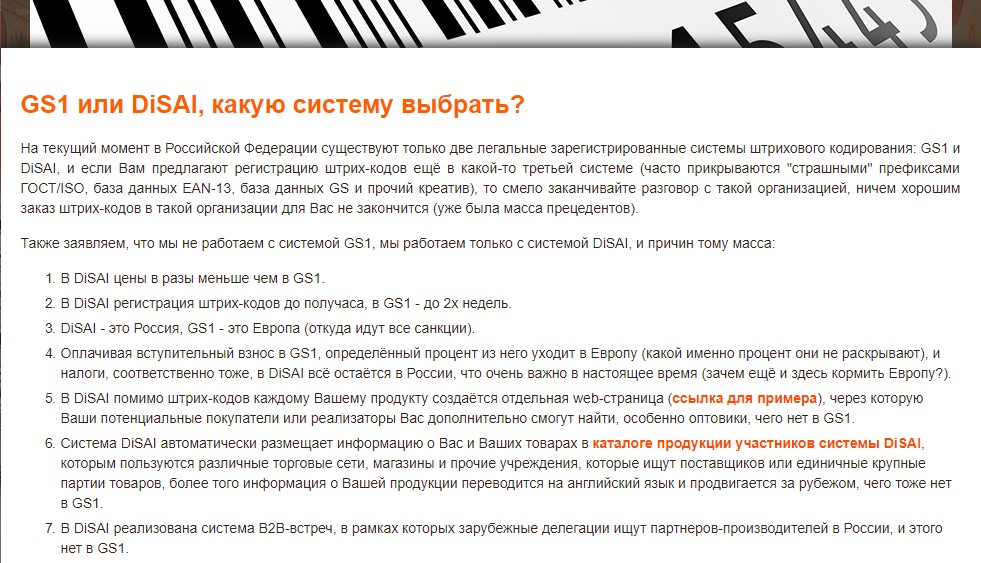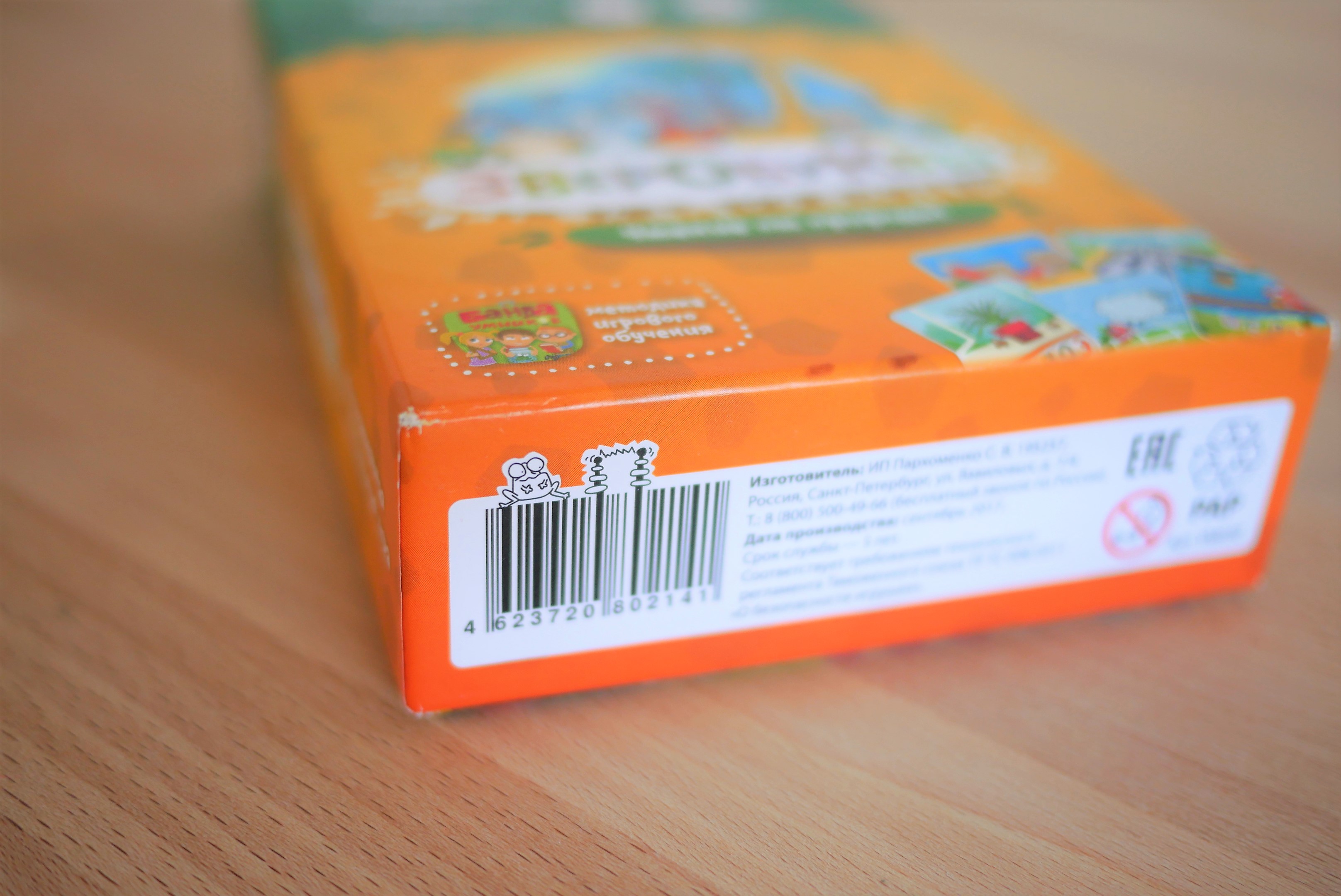How we tried to understand barcoding and did not understand anything.
Waking up one morning after a hectic sleep, I discovered that Fasim, where we registered bar codes for the Gang of Wise Men games, had disappeared. The lovely girl manager who did all the barcode work just disappeared: the subscriber is not a subscriber, emails are unanswered and the site shows a 404 error.
The fact is that when we resolved the issue with bar codes for the first time in 2013, our team consisted of 5 people, and we had to make bar codes literally in one day to conclude our first contract with a large network. Accordingly, for an urgent solution of the question, a random link from the search engine’s query output “barcode registration” was used. And then, by inertia, we simply sent the same people articles for new games for registration - other offers did not differ much in price, and everything was fine until the contractor disappeared.
It would seem, what problems? Find another contractor and pay him. But this time we tried to figure out where the barcodes come from, so as not to “work out like that time.” But when you open Google and try to sort out the question, full postmodernism begins.
Each product that is sold in networks and more or less large retail has a barcode. This is not a prerequisite, and is not fixed at all at the legal level. But outlets, as a rule, require a barcode - this makes it easier to manage inventory, work with the cashier and a whole lot more.
Barcode - a unique combination of numbers, which consists of a country code, supplier code and product code. When you bring a desktop to any network, and they bring it to the database, there should be no other such number. But how and by whom is this uniqueness ensured with an abundance of supply in the market?
On request “buy a barcode” - a million offers, from “EAN13 registration for half an hour” to package offers with the entry into the national bar-coding association with an annual organizational fee.
Is there in nature a single list of all registered codes? Where is the guarantee that the barcode of the educational children's game does not coincide with canned fish? Who and how to follow this?
Spoiler: no way!

After reviewing the existing offers on the market, we came to the conclusion that, apparently, some central barcode generators are two companies that offer to register barcodes: “Disai” and “GS1”. The rest, apparently, either acted as intermediaries, or gave out random sequences of numbers.
Now it was necessary to figure out: what is the difference between these two systems and how do they create conditions in which the barcode becomes a truly unique product nomenclature?
We started with the organization of GS1, which is listed in Wikipedia as the International Commodity Numbering Association. In 2005, these guys merged with the American bar-coding system, created 108 offices in different countries - in the format of non-profit organizations. To get a barcode through GS1, you need to submit an application, pay the registration fee, make annual contributions (about 15 thousand rubles for any number of bar codes), and you will be happy.
But what was alarming: only GS1 writes about the rights to a single global database of GS1 barcodes.

We decided to dispel doubts and enter into correspondence with them. They thought: "Surely, the representative of the company will give a clear explanation and help you figure it out." The main questions are: is it legal to use the barcodes that we have now, and how will they explain the offer to register codes from other companies?
During the correspondence with GS1, we were told that the codes for games from our missing contractor Fasim (which we use throughout Europe) are included in the register of the Estonian GS1 office. But Fasim did not register our right to these bar codes in GS1.
What to do? We are victims of scammers? Huge batches of our games are already sold in Europe with invalid bar codes? We will be punished according to the laws of the jungle? GS1 advised them to buy (again pay) for these bar codes their branch in Estonia and not to worry. Like, these codes are free, but they are about to buy.
We went further and decided to make sure that it was necessary to register the codes through GS1 and asked the GS1 representative about other organizations. Do you know what they answered? That all-all-all others are scammers!
Then we decided to look at the situation from all sides and write to the representatives of Disai. In response, Disai sent us a large and rather emotional letter:
However, in the next letter, they refer to an article about comparing the two systems, where very patriotic arguments in favor of Disai are presented, which we were very embarrassed:

It seemed to us that we were completely confused. But suddenly the manager of the company Fasim, through which we used to buy codes, got in touch! She explained her disappearance by technical work on the site and by changing the corporate phone number. We shared our observations with her, and, having received the answer, we got confused even more.
We did not find the answer to this question.

As a result, our old “European” barcodes from Fasim could not be registered with GS1 in the Estonian branch, they claim that they were already taken by another company. What exactly and with what goods - do not say. We ourselves could not find this information, difficulties have not arisen. It is possible that somewhere in the Czech Republic, under bar codes identical to ours, porcelain figurines of moose or peat briquettes are sold.
We are registering new bar codes for Europe in the GS1 Estonian branch, like everyone else is doing it - they decided to play it safe.
We stopped cooperation with the Fasim company - it is too alarming when a partner disappears from the horizon like this. In the Russian market, we register new bar codes at Disai: we purchased a package of 50 bar codes for 17 thousand rubles, simply because in our case it’s about 10 times more profitable for money than in GS1.
In general, this topic still leaves us at a loss, so if someone can shed light on the secret world of the emergence of bar codes - share in the comments!
The fact is that when we resolved the issue with bar codes for the first time in 2013, our team consisted of 5 people, and we had to make bar codes literally in one day to conclude our first contract with a large network. Accordingly, for an urgent solution of the question, a random link from the search engine’s query output “barcode registration” was used. And then, by inertia, we simply sent the same people articles for new games for registration - other offers did not differ much in price, and everything was fine until the contractor disappeared.
It would seem, what problems? Find another contractor and pay him. But this time we tried to figure out where the barcodes come from, so as not to “work out like that time.” But when you open Google and try to sort out the question, full postmodernism begins.
Each product that is sold in networks and more or less large retail has a barcode. This is not a prerequisite, and is not fixed at all at the legal level. But outlets, as a rule, require a barcode - this makes it easier to manage inventory, work with the cashier and a whole lot more.
Barcode - a unique combination of numbers, which consists of a country code, supplier code and product code. When you bring a desktop to any network, and they bring it to the database, there should be no other such number. But how and by whom is this uniqueness ensured with an abundance of supply in the market?
On request “buy a barcode” - a million offers, from “EAN13 registration for half an hour” to package offers with the entry into the national bar-coding association with an annual organizational fee.
Is there in nature a single list of all registered codes? Where is the guarantee that the barcode of the educational children's game does not coincide with canned fish? Who and how to follow this?
Spoiler: no way!
Barcode Fear and Loathing

After reviewing the existing offers on the market, we came to the conclusion that, apparently, some central barcode generators are two companies that offer to register barcodes: “Disai” and “GS1”. The rest, apparently, either acted as intermediaries, or gave out random sequences of numbers.
Now it was necessary to figure out: what is the difference between these two systems and how do they create conditions in which the barcode becomes a truly unique product nomenclature?
We started with the organization of GS1, which is listed in Wikipedia as the International Commodity Numbering Association. In 2005, these guys merged with the American bar-coding system, created 108 offices in different countries - in the format of non-profit organizations. To get a barcode through GS1, you need to submit an application, pay the registration fee, make annual contributions (about 15 thousand rubles for any number of bar codes), and you will be happy.
But what was alarming: only GS1 writes about the rights to a single global database of GS1 barcodes.

We decided to dispel doubts and enter into correspondence with them. They thought: "Surely, the representative of the company will give a clear explanation and help you figure it out." The main questions are: is it legal to use the barcodes that we have now, and how will they explain the offer to register codes from other companies?
During the correspondence with GS1, we were told that the codes for games from our missing contractor Fasim (which we use throughout Europe) are included in the register of the Estonian GS1 office. But Fasim did not register our right to these bar codes in GS1.
What to do? We are victims of scammers? Huge batches of our games are already sold in Europe with invalid bar codes? We will be punished according to the laws of the jungle? GS1 advised them to buy (again pay) for these bar codes their branch in Estonia and not to worry. Like, these codes are free, but they are about to buy.
We went further and decided to make sure that it was necessary to register the codes through GS1 and asked the GS1 representative about other organizations. Do you know what they answered? That all-all-all others are scammers!
“These are impostors. Go to the website gs1.org and see for yourself who conducts this activity in Russia. GS1 codes are globally distributed and valid worldwide.We thought hard. Especially over three points:
If you already work with retailers, many of them check barcodes and just don’t take your product.
Uniqueness and globality are achieved due to the fact that in every country of the world participating in the GS1 system, there is ONLY ONE organization (national organization GS1) that registers all participants. In Russia, such an organization is GS1 RUS. All others are amateur.
Disai is misleading its customers; they are not related to GS1. ”
GS1 representative
- “Go to the GS1 website and see for yourself who conducts this activity in Russia.” In general, it is logical that they write on their website what they like, but what does this prove?
- “If you work with retailers, many of them check the codes and just don’t take your product.” It sounds impressive, but how did we get into major chain stores before?
- "Disai is misleading its customers; they are not related to GS1." This last line of the letter broke our brains altogether. In general, we guessed that competing offices have no relation to each other.
Then we decided to look at the situation from all sides and write to the representatives of Disai. In response, Disai sent us a large and rather emotional letter:
“They [GS1] write very cunningly, but the fact is that in Russia no one except GS1rus can register barcodes in the GS1 system - this is true. But the fact that nowhere it is said that the system can be only one, for some reason they have forgotten to write.Well, Disai, at least did not deny the existence of an alternative coding system.
Once there was no GS1, then there was only GS1, then another ISBN appeared, now there is already a GS1, an ISBN, and a DISAI, maybe in the future there will be systems, who knows.
Unfortunately, there is no official information at the barcode level in Russia or in any other country.
There are Automatic Identification Associations that establish barcoding systems. In the statutes of these associations are written all the points about the bar-coding system, which they establish. These charters are registered with the Ministry of Justice, which has all the marks on the charters, including the official stamp of the Ministry of Justice.
And if in some way GS1 suddenly sells your codes to someone else (which cannot be all the same), then by the principle of primacy - who first entered the distribution network, he is right, because both systems exist officially. "
Disai representative
However, in the next letter, they refer to an article about comparing the two systems, where very patriotic arguments in favor of Disai are presented, which we were very embarrassed:

It seemed to us that we were completely confused. But suddenly the manager of the company Fasim, through which we used to buy codes, got in touch! She explained her disappearance by technical work on the site and by changing the corporate phone number. We shared our observations with her, and, having received the answer, we got confused even more.
“All several dozen companies that you found on the Internet will provide you with unique barcodes of the Russian Federation. I can not say for sure about foreign.But how is it that different companies that deny each other's existence and in parallel issue bar codes to different organizations, without having a single base and not verifying, can generate different combinations of numbers?
As for GS1 - this is simply the most famous company and one of the very first. They give out exactly the same codes, but with a bunch of headaches and checks, filling out a pile of documents. Plus, they cost more.
I will tell you that in the 4 years of working with barcoding, I have received a lot of bar codes to several thousand client companies. There were never any problems with crossing (coincidence). ”
Fasim representative
We did not find the answer to this question.
What is the result?

As a result, our old “European” barcodes from Fasim could not be registered with GS1 in the Estonian branch, they claim that they were already taken by another company. What exactly and with what goods - do not say. We ourselves could not find this information, difficulties have not arisen. It is possible that somewhere in the Czech Republic, under bar codes identical to ours, porcelain figurines of moose or peat briquettes are sold.
We are registering new bar codes for Europe in the GS1 Estonian branch, like everyone else is doing it - they decided to play it safe.
We stopped cooperation with the Fasim company - it is too alarming when a partner disappears from the horizon like this. In the Russian market, we register new bar codes at Disai: we purchased a package of 50 bar codes for 17 thousand rubles, simply because in our case it’s about 10 times more profitable for money than in GS1.
In general, this topic still leaves us at a loss, so if someone can shed light on the secret world of the emergence of bar codes - share in the comments!
